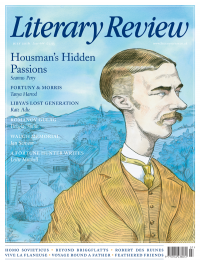Nakul Krishna
Creative Destruction
The Association of Small Bombs
By Karan Mahajan
Chatto & Windus 276pp £12.99
A small bomb goes off in a Delhi market, but the first lines of The Association of Small Bombs do not so much report this event as assume it. The novel uses the bombing as a fulcrum, around which it traces both the backstory and the aftermath. Karan Mahajan, for whom this second novel marks a scaling-up of ambition from the wry middle-class comedy of his first, Family Planning, concerns himself in turn with the bomb’s victims, survivors and makers. By the novel’s bitter, disenchanted end, it is unclear which of his characters falls into which category.
The bomb leaves the Khuranas, a Delhi couple who struggle to combine their liberal attitudes with an instinctive middle-class snobbery, mourning their two small sons. Their sons’ slightly older friend survives, carrying the trauma of the bomb into adulthood. The psychosomatic pain in his wrists prevents him from becoming a programmer; he finds himself drawn to an austere, strait-laced Islam. We also get the stories of the bombers, radicalised not by religion but by the daily humiliations and violence to which they are exposed in the densely militarised region of Kashmir, treated by every passing soldier and government official as potential fifth columnists.
Mahajan was born in Connecticut and grew up in New Delhi. He shows a keen sensitivity to political psychology, well aware that oppression is just as likely to make people stupid as saintly, that neither grief nor anger can cure pettiness or lust. He also knows that the terrorist, no

Sign Up to our newsletter
Receive free articles, highlights from the archive, news, details of prizes, and much more.@Lit_Review
Follow Literary Review on Twitter
Twitter Feed
Russia’s recent efforts to destabilise the Baltic states have increased enthusiasm for the EU in these places. With Euroscepticism growing in countries like France and Germany, @owenmatth wonders whether Europe’s salvation will come from its periphery.
Owen Matthews - Sea of Troubles
Owen Matthews: Sea of Troubles - Baltic: The Future of Europe by Oliver Moody
literaryreview.co.uk
Many laptop workers will find Vincenzo Latronico’s PERFECTION sends shivers of uncomfortable recognition down their spine. I wrote about why for @Lit_Review
https://literaryreview.co.uk/hashtag-living
An insightful review by @DanielB89913888 of In Covid’s Wake (Macedo & Lee, @PrincetonUPress).
Paraphrasing: left-leaning authors critique the Covid response using right-wing arguments. A fascinating read.
via @Lit_Review